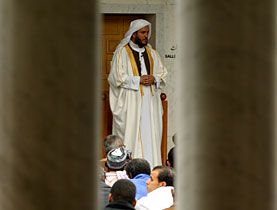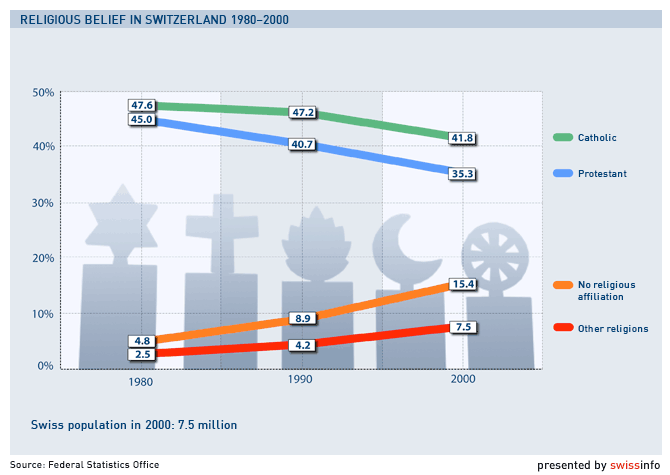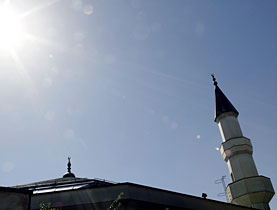Study finds consensus over imam training

Muslim communities and education authorities in Switzerland appear to agree that the country's universities could train future imams.
A study by the National Science Foundation has concluded that it is up to cantons to take the necessary steps to set up programmes, in cooperation with universities and Muslims.
Imams practising in Switzerland either leave the country for training or are imported from abroad. Researchers said that Muslim communities want “an authentic Islam and an Islam suitable for Switzerland” but are less enthusiastic about state intervention in training.
In 2008, the French government introduced a programme to sensitise Muslim leaders to the country’s history customs.
Swiss researchers said the results of their study brought some surprises.
“It refutes the general prejudice that consensus is not possible among the Muslim community and of a rift between Muslims and Swiss society,” said Ulrich Rudolph, professor at the Institute for Oriental Studies at Zurich University.
Rudolph said there is a widespread perception that the present situation of training mosque leaders is unsatisfactory, as imams from abroad are not familiar enough with the social and cultural background of Switzerland.
“Interviewees said teaching programmes for imams would increase the social competence of the clerics, facilitate integration and help ensure transparency as well as prevent Islamic extremism,” Rudolf told a news conference on Tuesday.
Rudolph pointed out that those interviewed considered the role of an imam in Switzerland to be similar to a Christian cleric. “He should not only be a preacher and teacher, but also an advisor in pastoral care”.
Politics
Christoph Uehlinger of the Institute of Religious Studies at Zurich University says it will be very difficult to try to implement the findings of the study without action from politicians.
“Still it shows that there are no legal obstacles and that the training of imams and religious teachers is desirable,” he said.
He added a such training could be attractive if it offers job opportunities to students.
“But it is not for social scientists to ensure that training programmes are set up. This is up to politicians and institutions,” Uehlinger said.
He said previous attempts to offer courses at the universities of Basel and Fribourg had limited success because of financial and organizational difficulties.
The survey found no conclusive answer to the question of funding but most institutions and organisations taking part in the survey were “surprising liberal” in their attitude over whether the state should make a financial contribution, said the authors of the study.
Necessity
In May, the government said it wanted to wait for the results of the study before taking position. None of the four main political parties have rejected training programmes for imams outright, according to Rudolph.
Tariq Ramadan, Switzerland’s most prominent Muslim intellectual, said courses for imams in Switzerland at a high level were a “necessity”.
He told the Swiss News Agency that it was crucial for imams to get training in their country of residence.
“I’m very pleased to see that steps are underway in Switzerland too,” said Ramadan.
He also welcomed proposals for a mixed funding, including from the state and taxes, in line with regulations governing Christian denominations in Switzerland.
Minarets
The study was based on interviews and questionnaires put to 140 religious, political groups and experts, including representatives of Muslim institutions.
It is part of a larger research project into religious communities and groups, proposed by the justice ministry four years ago. The aim is to improve communication and understanding in society where the religious makeup has changed over the past decade.
Switzerland’s Christian population and its national churches has seen the number of members dwindle over the past decade, while the influx of immigrants has led to an increase of Muslims. There is also an increase in the number of people with no religious affiliation, and non-denominational “free” churches are thriving, according to researchers.
There are no statistics for the number of imams active in Switzerland. Experts estimate the number of full-time Islamic clerics at “several dozen”, with many more part-time imams.
Publication of the study comes ahead of a vote in November on a highly controversial proposal to ban the construction of minarets in Switzerland.
The government and parliament have come out against the initiative by the rightwing Swiss People’s Party and Federal Democratic Union, amid opposition to the construction of minarets notably in the German-speaking part of the country.
Urs Geiser, swissinfo.ch
There are more than 350,000 Muslims in Switzerland – 5% of the country’s population. Most of them came from the Balkans and Turkey.
About two-thirds of the up to 160 mosque associations in Switzerland had a permanent imam in 2006, according to the Swiss Historical Lexicon.
Presently, imams practising in Switzerland receive their training abroad.
There are also courses at Basel and Fribourg universities, as well as in Winterthur for religious teachers and representatives of religious Muslim communities.


In compliance with the JTI standards
More: SWI swissinfo.ch certified by the Journalism Trust Initiative












You can find an overview of ongoing debates with our journalists here . Please join us!
If you want to start a conversation about a topic raised in this article or want to report factual errors, email us at english@swissinfo.ch.